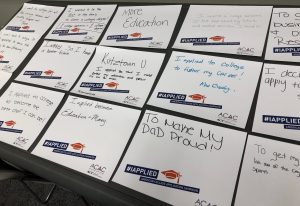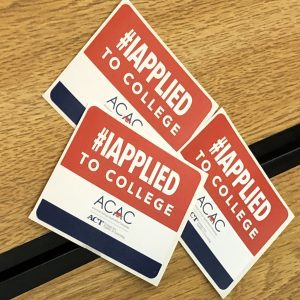
Photo provided by the school district of Lancaster
December is almost here which means nearly all of our state college application campaigns are coming to an end. Yet our work supporting those who want to apply to college is not done. Our campaign takes place during the fall each year to ensure our students, from the most underrepresented and economically-disadvantaged populations, apply to college during the same timeline as their most privileged peers. But, as we say goodbye to 2019 and welcome 2020, it’s important we remind our students and their families that it’s never too late to apply to college.
Many of our available resources can be used to support students as they navigate the college application process year round.
- For students still unsure where to apply: College Research Worksheet
- For students unsure if they can afford the application fee: College Application Fee Waiver Worksheet
- For students unsure what questions are asked on a college application: College Application Worksheet
- For conversation starters within the school building or local businesses: Ask Me About It posters
- For students as they receive acceptance letters: Accepted pennants
ACAC also recently released a Spanish version of the Pre-College and Career Readiness Curriculum for Students and Their Families. This curriculum is intended for high school counselors and college access professionals who work with students and their families to help them understand and prepare for the various college-going processes. This curriculum provides students and their families an opportunity to become familiar with the language and processes associated with obtaining a postsecondary degree or credential by:
- assisting students to understand how to plan for postsecondary education while in high school;
- connecting personal interests and values to college majors and careers;
- encouraging students to develop a values-driven, decision-making process; and
- providing insight on how to pay for college.

Photo provided by the school district of Lancaster
As the college application campaign season wound down, we hosted an #IApplied Twitter chat with Better Make Room, Get Schooled, and Reach Higher. The goal of the chat was to remind students it’s not too late to apply by answering the questions students and their families most frequently ask about the college application process.
Many of the top questions students ask demonstrate how the senior-year college-going process can be overwhelming, confusing, and intimidating to all students, but especially those who would be the first in their family to go to college. This Twitter chat was a great reminder of how effective we can be when we come together to support students as they pursue education and training beyond high school.
While our work is not done, we hope that the efforts of the estimated 8,000+ college application events across the country have ensured more students are on a similar senior-year timeline, allowing for counselors and college advisers to have more time to work with the students who need the most support.
